Tourism Management: Sustainability, Stakeholders, and Development
VerifiedAdded on 2023/01/04
|16
|5130
|84
Report
AI Summary
This report provides a comprehensive analysis of sustainable and responsible tourism management, focusing on the evolution of the concept, the roles of global organizations, and the principles of tourism development planning aimed at minimizing adverse effects. It examines the social, economic, environmental, and cultural impacts of tourism, highlighting the importance of stakeholder engagement and partnerships in achieving sustainable objectives. The report also explores how sustainability is managed in various tourist destinations worldwide, critically evaluating the successes and failures of sustainable development initiatives and offering recommendations for improvement. The case study of Costa Rica, with its commitment to renewable resources and biodiversity conservation, serves as a practical example of sustainable tourism practices. This document is available on Desklib, a platform offering a range of study tools and solved assignments for students.
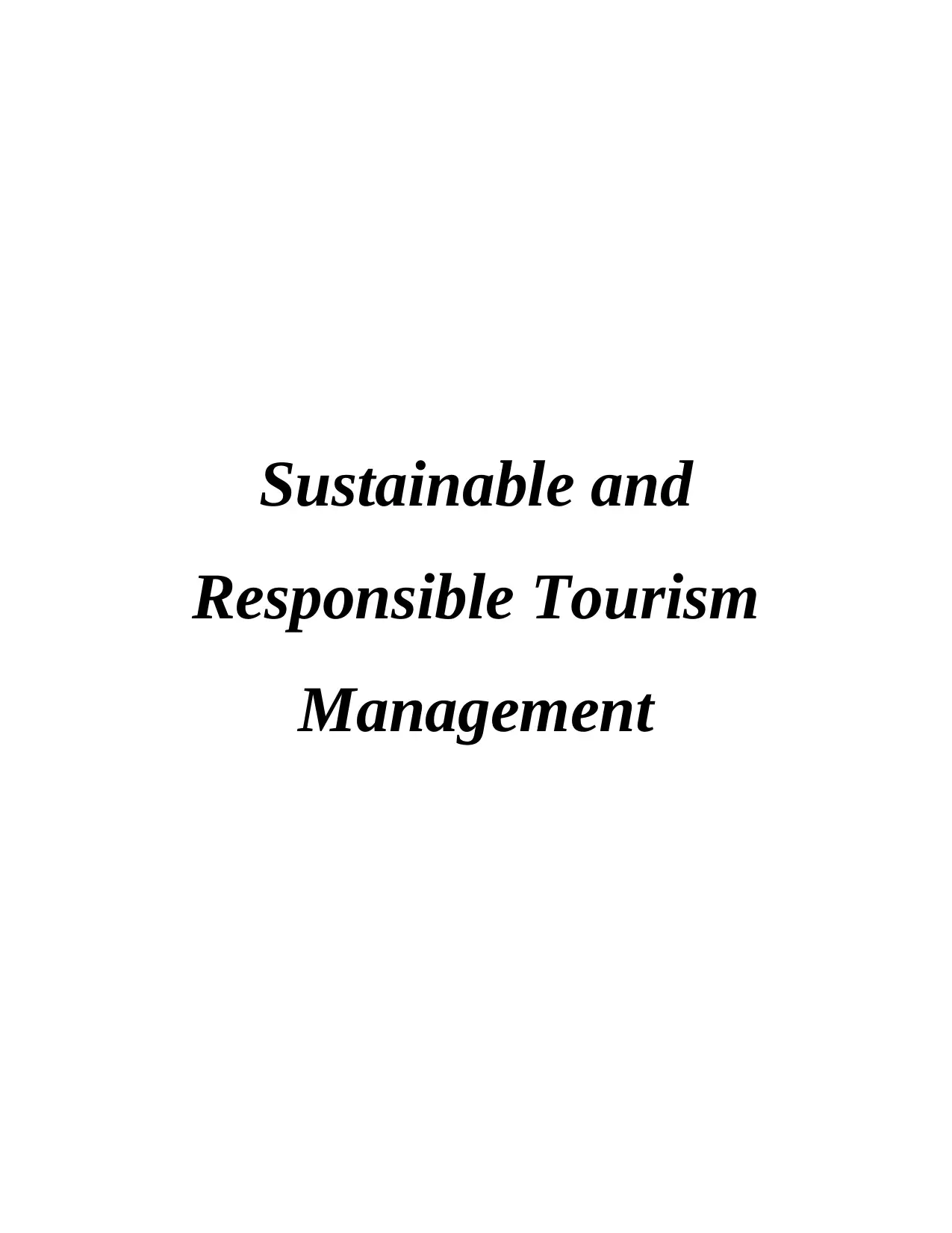
Sustainable and
Responsible Tourism
Management
Responsible Tourism
Management
Paraphrase This Document
Need a fresh take? Get an instant paraphrase of this document with our AI Paraphraser
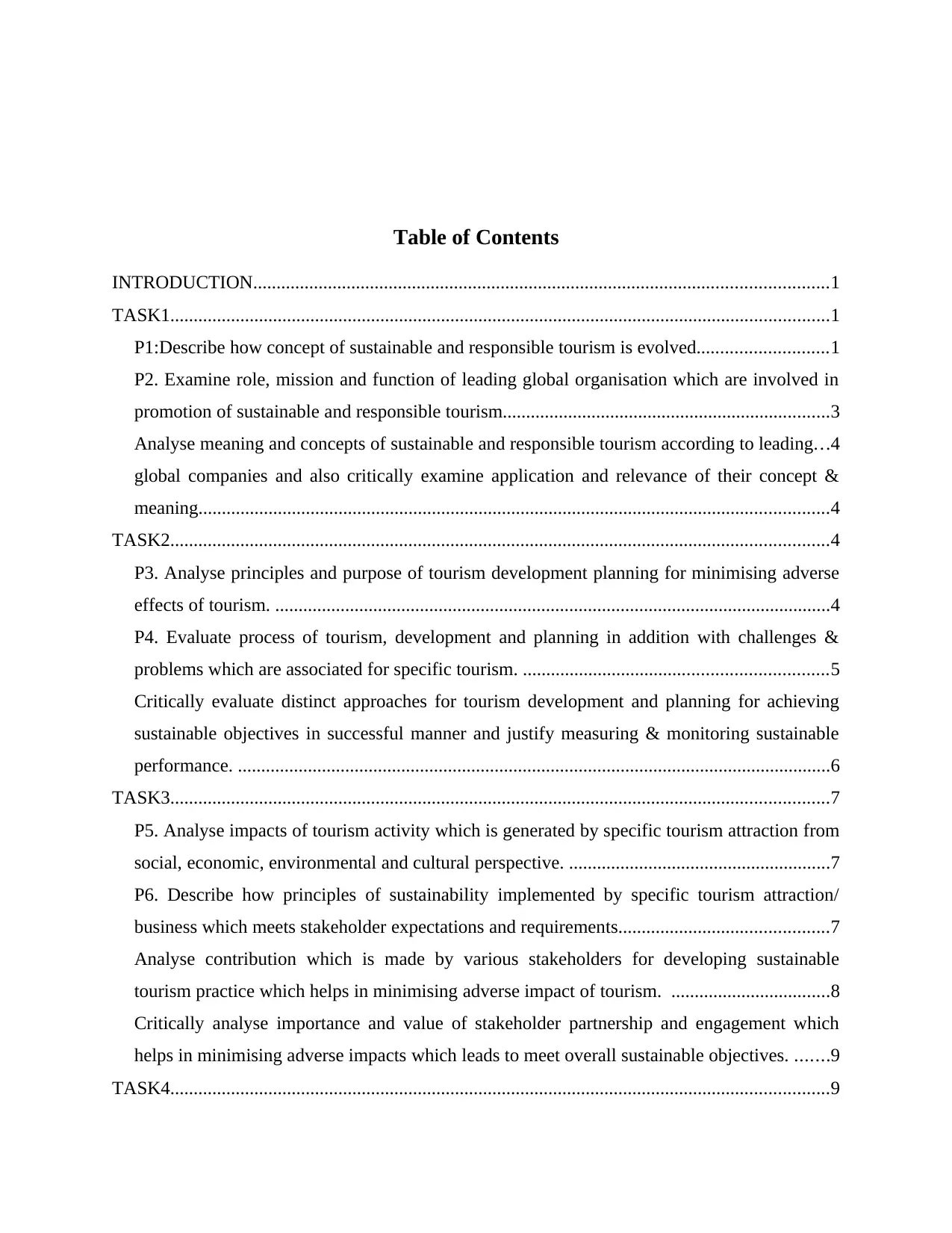
Table of Contents
INTRODUCTION...........................................................................................................................1
TASK1.............................................................................................................................................1
P1:Describe how concept of sustainable and responsible tourism is evolved............................1
P2. Examine role, mission and function of leading global organisation which are involved in
promotion of sustainable and responsible tourism......................................................................3
Analyse meaning and concepts of sustainable and responsible tourism according to leading...4
global companies and also critically examine application and relevance of their concept &
meaning.......................................................................................................................................4
TASK2.............................................................................................................................................4
P3. Analyse principles and purpose of tourism development planning for minimising adverse
effects of tourism. .......................................................................................................................4
P4. Evaluate process of tourism, development and planning in addition with challenges &
problems which are associated for specific tourism. .................................................................5
Critically evaluate distinct approaches for tourism development and planning for achieving
sustainable objectives in successful manner and justify measuring & monitoring sustainable
performance. ...............................................................................................................................6
TASK3.............................................................................................................................................7
P5. Analyse impacts of tourism activity which is generated by specific tourism attraction from
social, economic, environmental and cultural perspective. ........................................................7
P6. Describe how principles of sustainability implemented by specific tourism attraction/
business which meets stakeholder expectations and requirements.............................................7
Analyse contribution which is made by various stakeholders for developing sustainable
tourism practice which helps in minimising adverse impact of tourism. ..................................8
Critically analyse importance and value of stakeholder partnership and engagement which
helps in minimising adverse impacts which leads to meet overall sustainable objectives. .......9
TASK4.............................................................................................................................................9
INTRODUCTION...........................................................................................................................1
TASK1.............................................................................................................................................1
P1:Describe how concept of sustainable and responsible tourism is evolved............................1
P2. Examine role, mission and function of leading global organisation which are involved in
promotion of sustainable and responsible tourism......................................................................3
Analyse meaning and concepts of sustainable and responsible tourism according to leading...4
global companies and also critically examine application and relevance of their concept &
meaning.......................................................................................................................................4
TASK2.............................................................................................................................................4
P3. Analyse principles and purpose of tourism development planning for minimising adverse
effects of tourism. .......................................................................................................................4
P4. Evaluate process of tourism, development and planning in addition with challenges &
problems which are associated for specific tourism. .................................................................5
Critically evaluate distinct approaches for tourism development and planning for achieving
sustainable objectives in successful manner and justify measuring & monitoring sustainable
performance. ...............................................................................................................................6
TASK3.............................................................................................................................................7
P5. Analyse impacts of tourism activity which is generated by specific tourism attraction from
social, economic, environmental and cultural perspective. ........................................................7
P6. Describe how principles of sustainability implemented by specific tourism attraction/
business which meets stakeholder expectations and requirements.............................................7
Analyse contribution which is made by various stakeholders for developing sustainable
tourism practice which helps in minimising adverse impact of tourism. ..................................8
Critically analyse importance and value of stakeholder partnership and engagement which
helps in minimising adverse impacts which leads to meet overall sustainable objectives. .......9
TASK4.............................................................................................................................................9
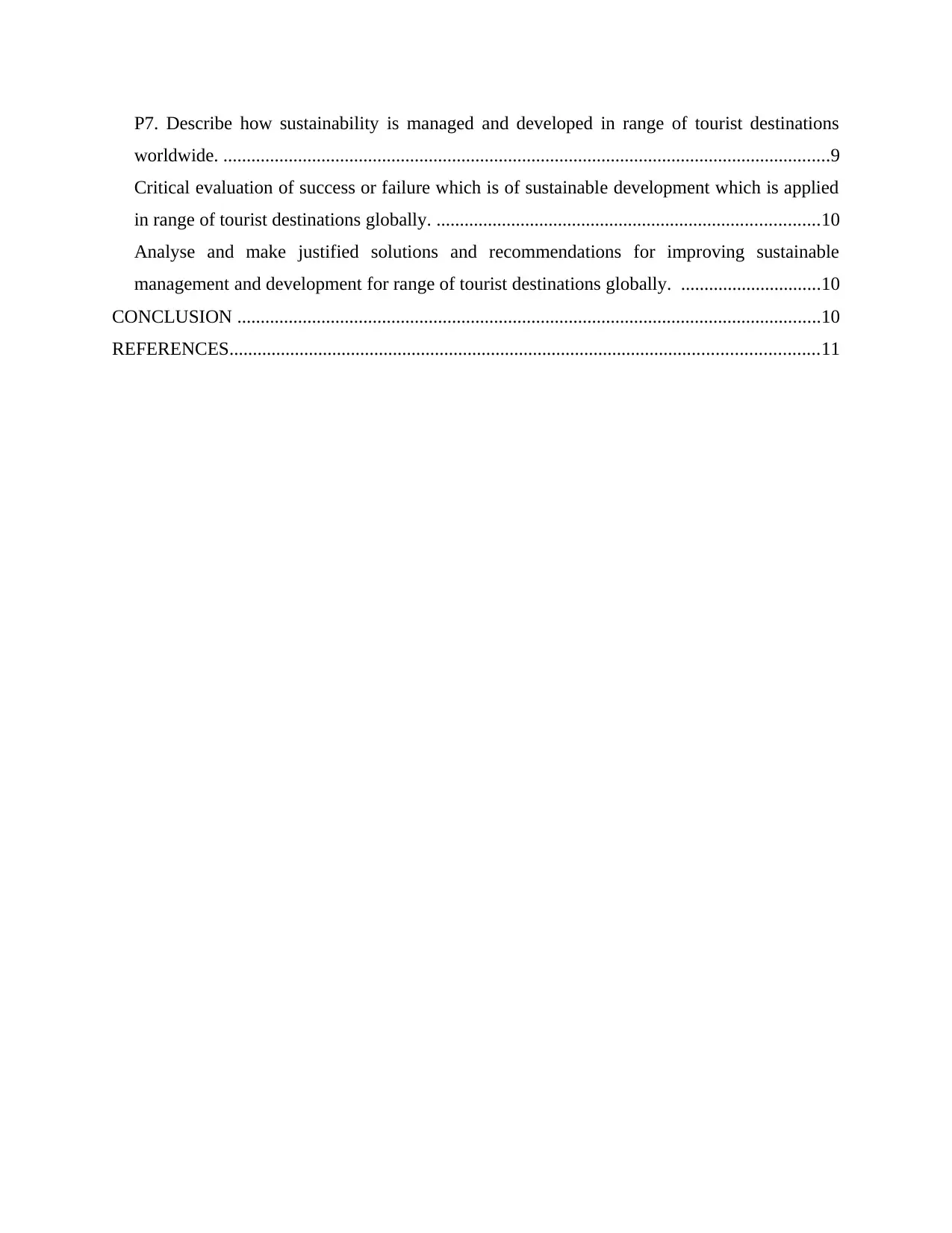
P7. Describe how sustainability is managed and developed in range of tourist destinations
worldwide. ..................................................................................................................................9
Critical evaluation of success or failure which is of sustainable development which is applied
in range of tourist destinations globally. ..................................................................................10
Analyse and make justified solutions and recommendations for improving sustainable
management and development for range of tourist destinations globally. ..............................10
CONCLUSION .............................................................................................................................10
REFERENCES..............................................................................................................................11
worldwide. ..................................................................................................................................9
Critical evaluation of success or failure which is of sustainable development which is applied
in range of tourist destinations globally. ..................................................................................10
Analyse and make justified solutions and recommendations for improving sustainable
management and development for range of tourist destinations globally. ..............................10
CONCLUSION .............................................................................................................................10
REFERENCES..............................................................................................................................11
⊘ This is a preview!⊘
Do you want full access?
Subscribe today to unlock all pages.

Trusted by 1+ million students worldwide
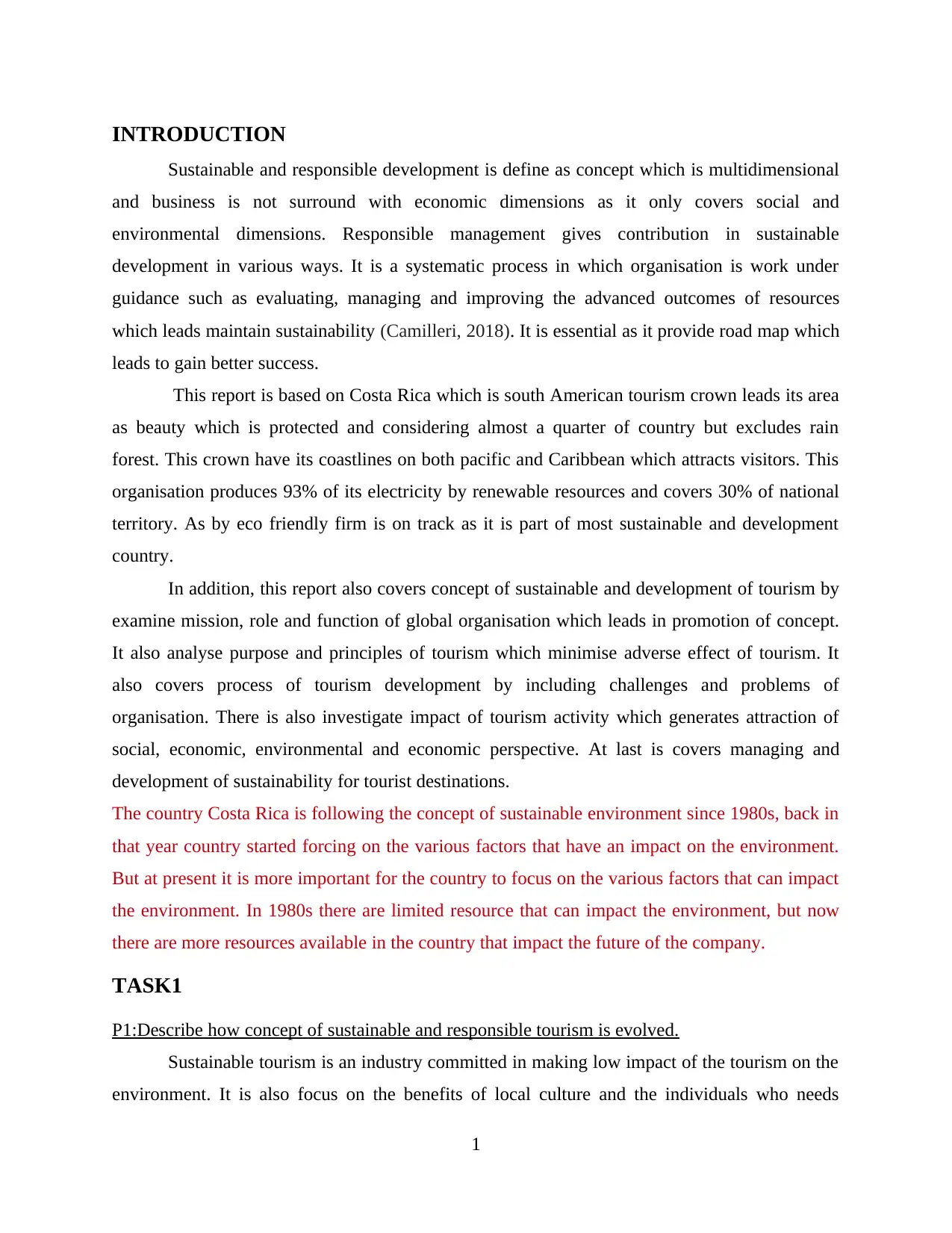
INTRODUCTION
Sustainable and responsible development is define as concept which is multidimensional
and business is not surround with economic dimensions as it only covers social and
environmental dimensions. Responsible management gives contribution in sustainable
development in various ways. It is a systematic process in which organisation is work under
guidance such as evaluating, managing and improving the advanced outcomes of resources
which leads maintain sustainability (Camilleri, 2018). It is essential as it provide road map which
leads to gain better success.
This report is based on Costa Rica which is south American tourism crown leads its area
as beauty which is protected and considering almost a quarter of country but excludes rain
forest. This crown have its coastlines on both pacific and Caribbean which attracts visitors. This
organisation produces 93% of its electricity by renewable resources and covers 30% of national
territory. As by eco friendly firm is on track as it is part of most sustainable and development
country.
In addition, this report also covers concept of sustainable and development of tourism by
examine mission, role and function of global organisation which leads in promotion of concept.
It also analyse purpose and principles of tourism which minimise adverse effect of tourism. It
also covers process of tourism development by including challenges and problems of
organisation. There is also investigate impact of tourism activity which generates attraction of
social, economic, environmental and economic perspective. At last is covers managing and
development of sustainability for tourist destinations.
The country Costa Rica is following the concept of sustainable environment since 1980s, back in
that year country started forcing on the various factors that have an impact on the environment.
But at present it is more important for the country to focus on the various factors that can impact
the environment. In 1980s there are limited resource that can impact the environment, but now
there are more resources available in the country that impact the future of the company.
TASK1
P1:Describe how concept of sustainable and responsible tourism is evolved.
Sustainable tourism is an industry committed in making low impact of the tourism on the
environment. It is also focus on the benefits of local culture and the individuals who needs
1
Sustainable and responsible development is define as concept which is multidimensional
and business is not surround with economic dimensions as it only covers social and
environmental dimensions. Responsible management gives contribution in sustainable
development in various ways. It is a systematic process in which organisation is work under
guidance such as evaluating, managing and improving the advanced outcomes of resources
which leads maintain sustainability (Camilleri, 2018). It is essential as it provide road map which
leads to gain better success.
This report is based on Costa Rica which is south American tourism crown leads its area
as beauty which is protected and considering almost a quarter of country but excludes rain
forest. This crown have its coastlines on both pacific and Caribbean which attracts visitors. This
organisation produces 93% of its electricity by renewable resources and covers 30% of national
territory. As by eco friendly firm is on track as it is part of most sustainable and development
country.
In addition, this report also covers concept of sustainable and development of tourism by
examine mission, role and function of global organisation which leads in promotion of concept.
It also analyse purpose and principles of tourism which minimise adverse effect of tourism. It
also covers process of tourism development by including challenges and problems of
organisation. There is also investigate impact of tourism activity which generates attraction of
social, economic, environmental and economic perspective. At last is covers managing and
development of sustainability for tourist destinations.
The country Costa Rica is following the concept of sustainable environment since 1980s, back in
that year country started forcing on the various factors that have an impact on the environment.
But at present it is more important for the country to focus on the various factors that can impact
the environment. In 1980s there are limited resource that can impact the environment, but now
there are more resources available in the country that impact the future of the company.
TASK1
P1:Describe how concept of sustainable and responsible tourism is evolved.
Sustainable tourism is an industry committed in making low impact of the tourism on the
environment. It is also focus on the benefits of local culture and the individuals who needs
1
Paraphrase This Document
Need a fresh take? Get an instant paraphrase of this document with our AI Paraphraser
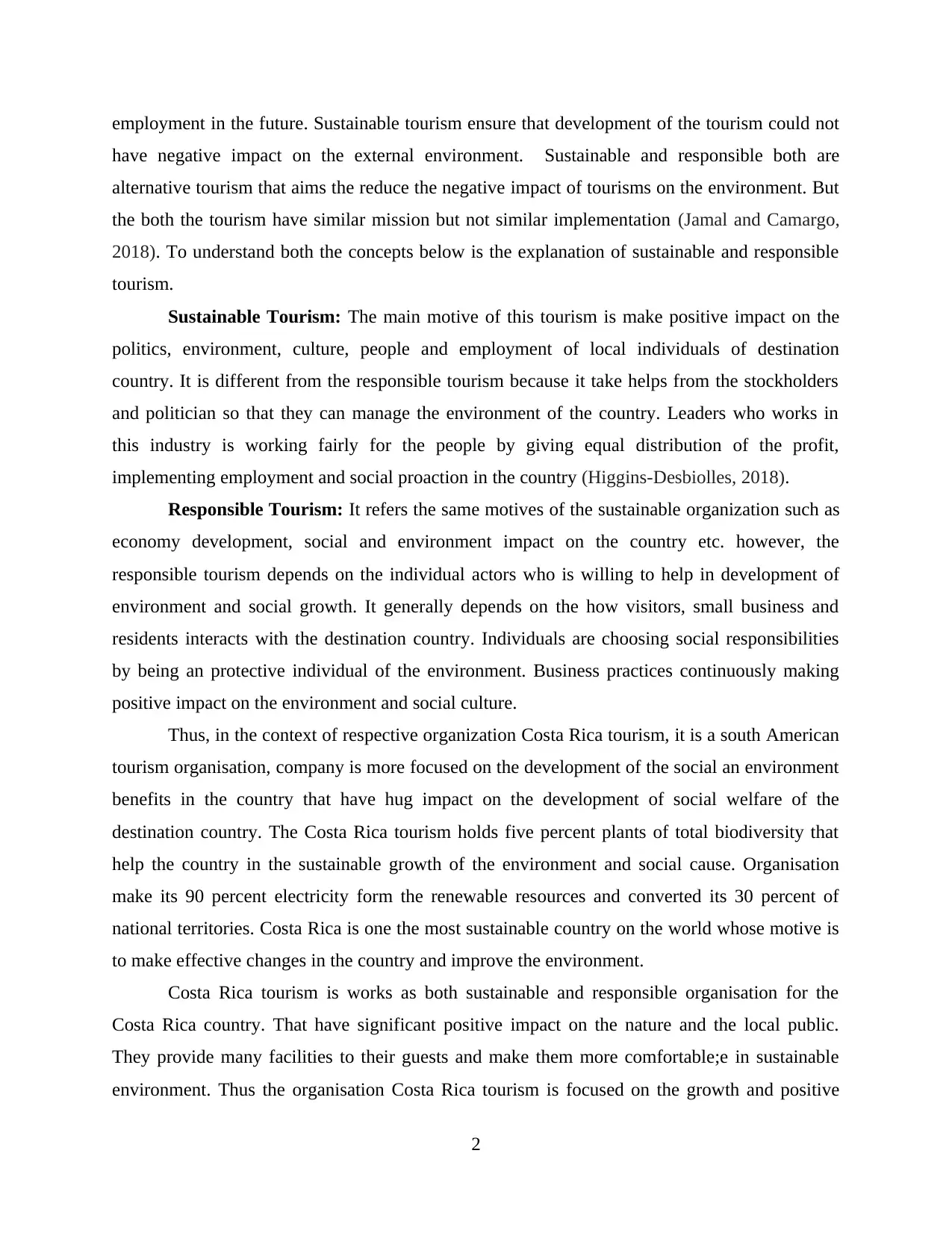
employment in the future. Sustainable tourism ensure that development of the tourism could not
have negative impact on the external environment. Sustainable and responsible both are
alternative tourism that aims the reduce the negative impact of tourisms on the environment. But
the both the tourism have similar mission but not similar implementation (Jamal and Camargo,
2018). To understand both the concepts below is the explanation of sustainable and responsible
tourism.
Sustainable Tourism: The main motive of this tourism is make positive impact on the
politics, environment, culture, people and employment of local individuals of destination
country. It is different from the responsible tourism because it take helps from the stockholders
and politician so that they can manage the environment of the country. Leaders who works in
this industry is working fairly for the people by giving equal distribution of the profit,
implementing employment and social proaction in the country (Higgins-Desbiolles, 2018).
Responsible Tourism: It refers the same motives of the sustainable organization such as
economy development, social and environment impact on the country etc. however, the
responsible tourism depends on the individual actors who is willing to help in development of
environment and social growth. It generally depends on the how visitors, small business and
residents interacts with the destination country. Individuals are choosing social responsibilities
by being an protective individual of the environment. Business practices continuously making
positive impact on the environment and social culture.
Thus, in the context of respective organization Costa Rica tourism, it is a south American
tourism organisation, company is more focused on the development of the social an environment
benefits in the country that have hug impact on the development of social welfare of the
destination country. The Costa Rica tourism holds five percent plants of total biodiversity that
help the country in the sustainable growth of the environment and social cause. Organisation
make its 90 percent electricity form the renewable resources and converted its 30 percent of
national territories. Costa Rica is one the most sustainable country on the world whose motive is
to make effective changes in the country and improve the environment.
Costa Rica tourism is works as both sustainable and responsible organisation for the
Costa Rica country. That have significant positive impact on the nature and the local public.
They provide many facilities to their guests and make them more comfortable;e in sustainable
environment. Thus the organisation Costa Rica tourism is focused on the growth and positive
2
have negative impact on the external environment. Sustainable and responsible both are
alternative tourism that aims the reduce the negative impact of tourisms on the environment. But
the both the tourism have similar mission but not similar implementation (Jamal and Camargo,
2018). To understand both the concepts below is the explanation of sustainable and responsible
tourism.
Sustainable Tourism: The main motive of this tourism is make positive impact on the
politics, environment, culture, people and employment of local individuals of destination
country. It is different from the responsible tourism because it take helps from the stockholders
and politician so that they can manage the environment of the country. Leaders who works in
this industry is working fairly for the people by giving equal distribution of the profit,
implementing employment and social proaction in the country (Higgins-Desbiolles, 2018).
Responsible Tourism: It refers the same motives of the sustainable organization such as
economy development, social and environment impact on the country etc. however, the
responsible tourism depends on the individual actors who is willing to help in development of
environment and social growth. It generally depends on the how visitors, small business and
residents interacts with the destination country. Individuals are choosing social responsibilities
by being an protective individual of the environment. Business practices continuously making
positive impact on the environment and social culture.
Thus, in the context of respective organization Costa Rica tourism, it is a south American
tourism organisation, company is more focused on the development of the social an environment
benefits in the country that have hug impact on the development of social welfare of the
destination country. The Costa Rica tourism holds five percent plants of total biodiversity that
help the country in the sustainable growth of the environment and social cause. Organisation
make its 90 percent electricity form the renewable resources and converted its 30 percent of
national territories. Costa Rica is one the most sustainable country on the world whose motive is
to make effective changes in the country and improve the environment.
Costa Rica tourism is works as both sustainable and responsible organisation for the
Costa Rica country. That have significant positive impact on the nature and the local public.
They provide many facilities to their guests and make them more comfortable;e in sustainable
environment. Thus the organisation Costa Rica tourism is focused on the growth and positive
2
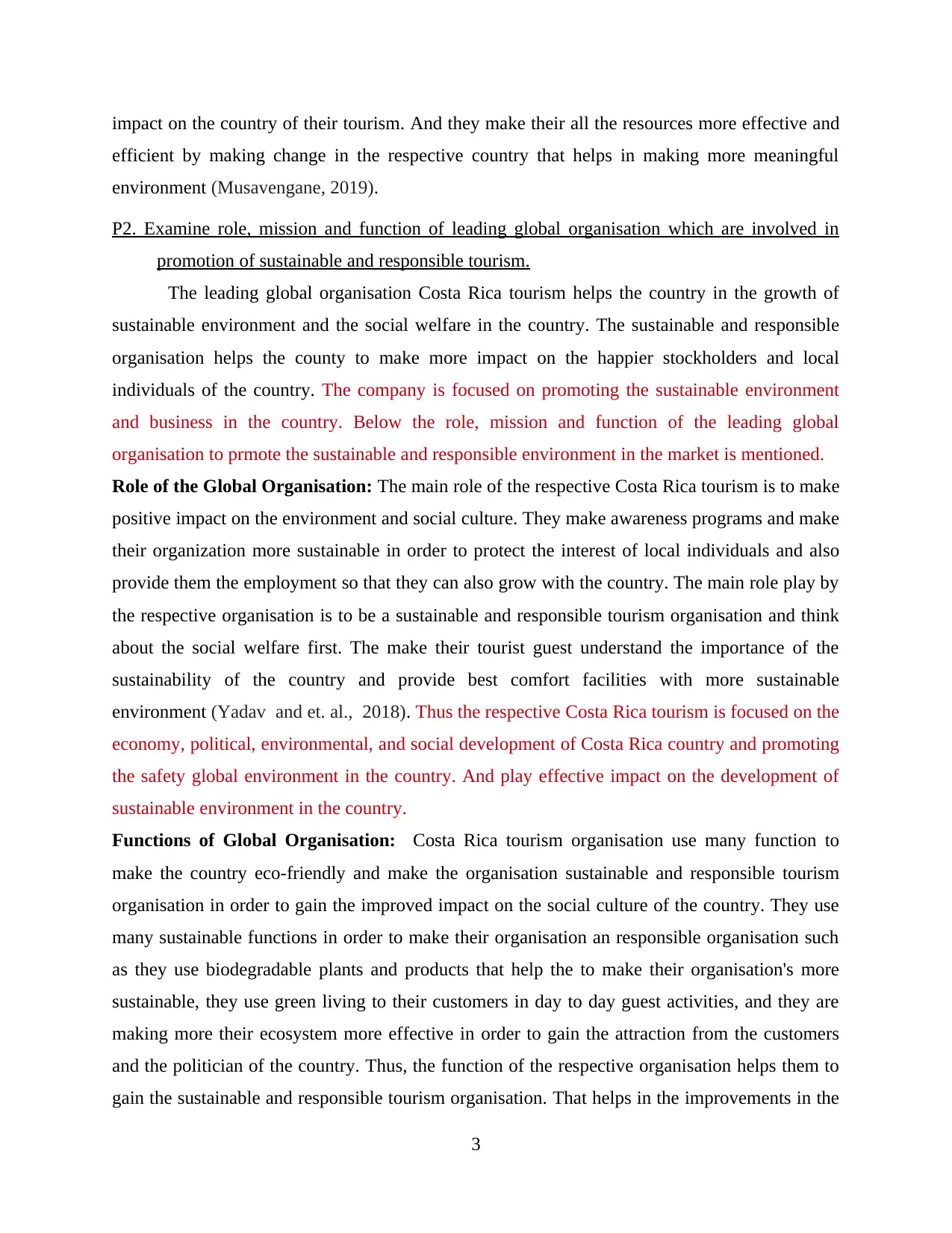
impact on the country of their tourism. And they make their all the resources more effective and
efficient by making change in the respective country that helps in making more meaningful
environment (Musavengane, 2019).
P2. Examine role, mission and function of leading global organisation which are involved in
promotion of sustainable and responsible tourism.
The leading global organisation Costa Rica tourism helps the country in the growth of
sustainable environment and the social welfare in the country. The sustainable and responsible
organisation helps the county to make more impact on the happier stockholders and local
individuals of the country. The company is focused on promoting the sustainable environment
and business in the country. Below the role, mission and function of the leading global
organisation to prmote the sustainable and responsible environment in the market is mentioned.
Role of the Global Organisation: The main role of the respective Costa Rica tourism is to make
positive impact on the environment and social culture. They make awareness programs and make
their organization more sustainable in order to protect the interest of local individuals and also
provide them the employment so that they can also grow with the country. The main role play by
the respective organisation is to be a sustainable and responsible tourism organisation and think
about the social welfare first. The make their tourist guest understand the importance of the
sustainability of the country and provide best comfort facilities with more sustainable
environment (Yadav and et. al., 2018). Thus the respective Costa Rica tourism is focused on the
economy, political, environmental, and social development of Costa Rica country and promoting
the safety global environment in the country. And play effective impact on the development of
sustainable environment in the country.
Functions of Global Organisation: Costa Rica tourism organisation use many function to
make the country eco-friendly and make the organisation sustainable and responsible tourism
organisation in order to gain the improved impact on the social culture of the country. They use
many sustainable functions in order to make their organisation an responsible organisation such
as they use biodegradable plants and products that help the to make their organisation's more
sustainable, they use green living to their customers in day to day guest activities, and they are
making more their ecosystem more effective in order to gain the attraction from the customers
and the politician of the country. Thus, the function of the respective organisation helps them to
gain the sustainable and responsible tourism organisation. That helps in the improvements in the
3
efficient by making change in the respective country that helps in making more meaningful
environment (Musavengane, 2019).
P2. Examine role, mission and function of leading global organisation which are involved in
promotion of sustainable and responsible tourism.
The leading global organisation Costa Rica tourism helps the country in the growth of
sustainable environment and the social welfare in the country. The sustainable and responsible
organisation helps the county to make more impact on the happier stockholders and local
individuals of the country. The company is focused on promoting the sustainable environment
and business in the country. Below the role, mission and function of the leading global
organisation to prmote the sustainable and responsible environment in the market is mentioned.
Role of the Global Organisation: The main role of the respective Costa Rica tourism is to make
positive impact on the environment and social culture. They make awareness programs and make
their organization more sustainable in order to protect the interest of local individuals and also
provide them the employment so that they can also grow with the country. The main role play by
the respective organisation is to be a sustainable and responsible tourism organisation and think
about the social welfare first. The make their tourist guest understand the importance of the
sustainability of the country and provide best comfort facilities with more sustainable
environment (Yadav and et. al., 2018). Thus the respective Costa Rica tourism is focused on the
economy, political, environmental, and social development of Costa Rica country and promoting
the safety global environment in the country. And play effective impact on the development of
sustainable environment in the country.
Functions of Global Organisation: Costa Rica tourism organisation use many function to
make the country eco-friendly and make the organisation sustainable and responsible tourism
organisation in order to gain the improved impact on the social culture of the country. They use
many sustainable functions in order to make their organisation an responsible organisation such
as they use biodegradable plants and products that help the to make their organisation's more
sustainable, they use green living to their customers in day to day guest activities, and they are
making more their ecosystem more effective in order to gain the attraction from the customers
and the politician of the country. Thus, the function of the respective organisation helps them to
gain the sustainable and responsible tourism organisation. That helps in the improvements in the
3
⊘ This is a preview!⊘
Do you want full access?
Subscribe today to unlock all pages.

Trusted by 1+ million students worldwide
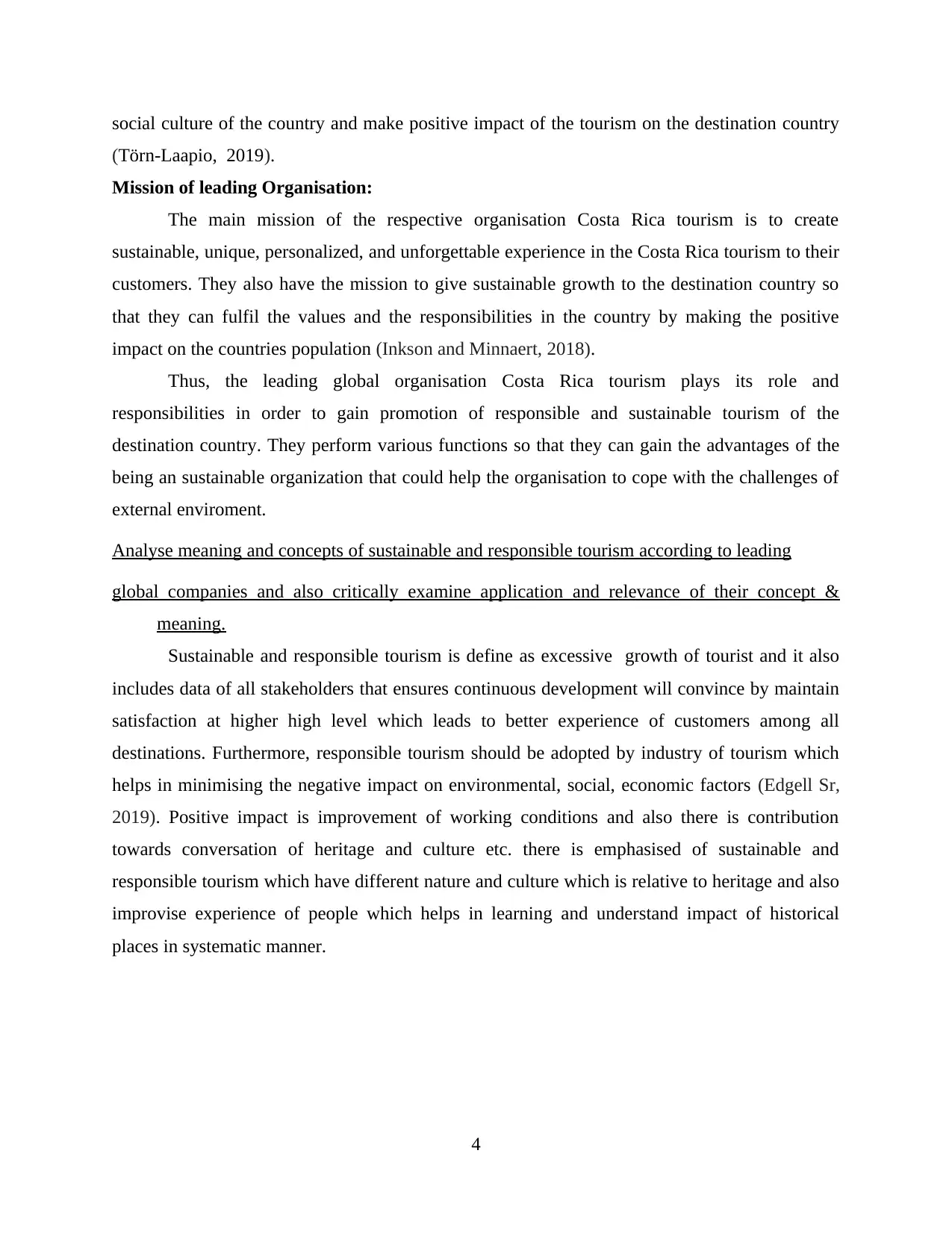
social culture of the country and make positive impact of the tourism on the destination country
(Törn-Laapio, 2019).
Mission of leading Organisation:
The main mission of the respective organisation Costa Rica tourism is to create
sustainable, unique, personalized, and unforgettable experience in the Costa Rica tourism to their
customers. They also have the mission to give sustainable growth to the destination country so
that they can fulfil the values and the responsibilities in the country by making the positive
impact on the countries population (Inkson and Minnaert, 2018).
Thus, the leading global organisation Costa Rica tourism plays its role and
responsibilities in order to gain promotion of responsible and sustainable tourism of the
destination country. They perform various functions so that they can gain the advantages of the
being an sustainable organization that could help the organisation to cope with the challenges of
external enviroment.
Analyse meaning and concepts of sustainable and responsible tourism according to leading
global companies and also critically examine application and relevance of their concept &
meaning.
Sustainable and responsible tourism is define as excessive growth of tourist and it also
includes data of all stakeholders that ensures continuous development will convince by maintain
satisfaction at higher high level which leads to better experience of customers among all
destinations. Furthermore, responsible tourism should be adopted by industry of tourism which
helps in minimising the negative impact on environmental, social, economic factors (Edgell Sr,
2019). Positive impact is improvement of working conditions and also there is contribution
towards conversation of heritage and culture etc. there is emphasised of sustainable and
responsible tourism which have different nature and culture which is relative to heritage and also
improvise experience of people which helps in learning and understand impact of historical
places in systematic manner.
4
(Törn-Laapio, 2019).
Mission of leading Organisation:
The main mission of the respective organisation Costa Rica tourism is to create
sustainable, unique, personalized, and unforgettable experience in the Costa Rica tourism to their
customers. They also have the mission to give sustainable growth to the destination country so
that they can fulfil the values and the responsibilities in the country by making the positive
impact on the countries population (Inkson and Minnaert, 2018).
Thus, the leading global organisation Costa Rica tourism plays its role and
responsibilities in order to gain promotion of responsible and sustainable tourism of the
destination country. They perform various functions so that they can gain the advantages of the
being an sustainable organization that could help the organisation to cope with the challenges of
external enviroment.
Analyse meaning and concepts of sustainable and responsible tourism according to leading
global companies and also critically examine application and relevance of their concept &
meaning.
Sustainable and responsible tourism is define as excessive growth of tourist and it also
includes data of all stakeholders that ensures continuous development will convince by maintain
satisfaction at higher high level which leads to better experience of customers among all
destinations. Furthermore, responsible tourism should be adopted by industry of tourism which
helps in minimising the negative impact on environmental, social, economic factors (Edgell Sr,
2019). Positive impact is improvement of working conditions and also there is contribution
towards conversation of heritage and culture etc. there is emphasised of sustainable and
responsible tourism which have different nature and culture which is relative to heritage and also
improvise experience of people which helps in learning and understand impact of historical
places in systematic manner.
4
Paraphrase This Document
Need a fresh take? Get an instant paraphrase of this document with our AI Paraphraser
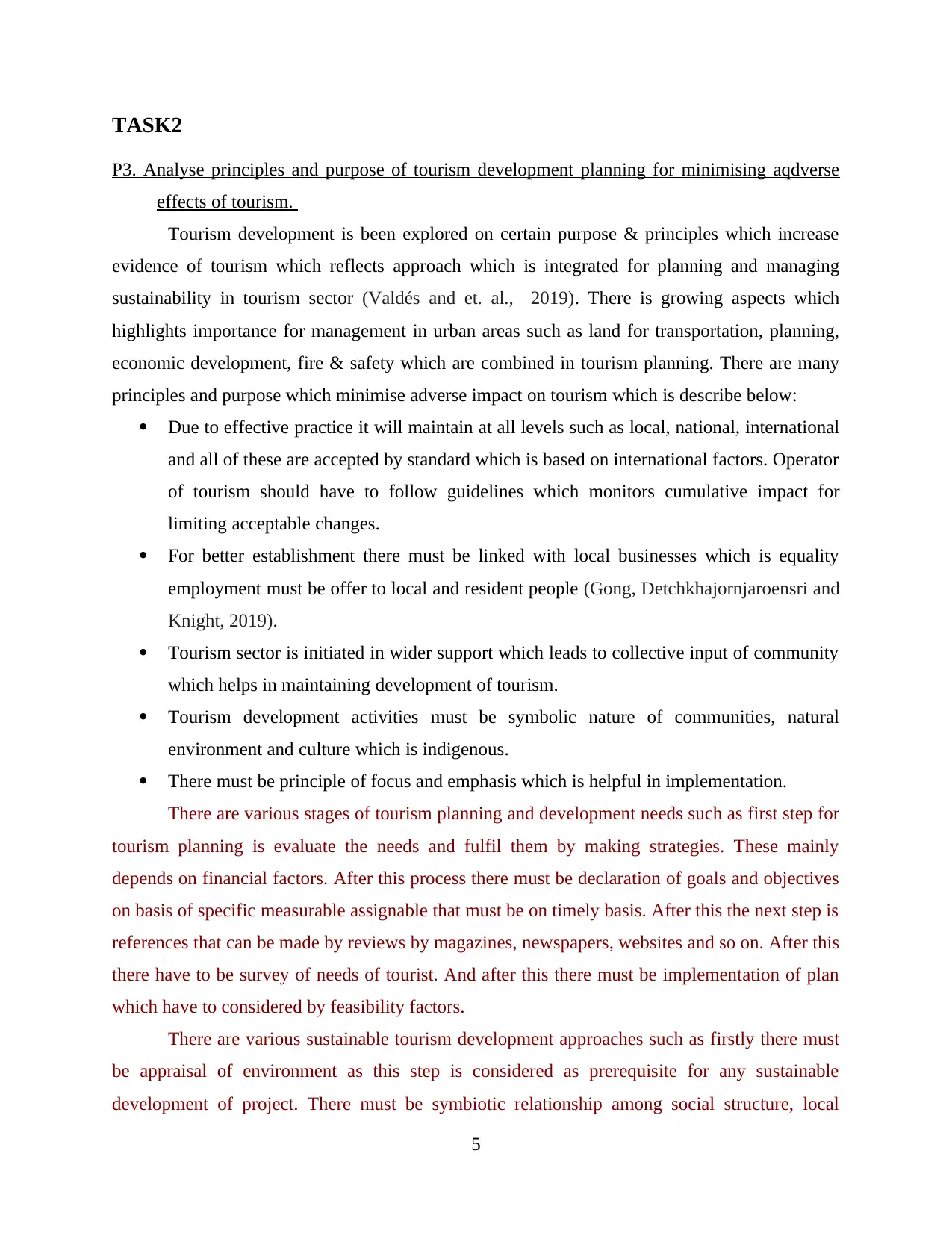
TASK2
P3. Analyse principles and purpose of tourism development planning for minimising aqdverse
effects of tourism.
Tourism development is been explored on certain purpose & principles which increase
evidence of tourism which reflects approach which is integrated for planning and managing
sustainability in tourism sector (Valdés and et. al., 2019). There is growing aspects which
highlights importance for management in urban areas such as land for transportation, planning,
economic development, fire & safety which are combined in tourism planning. There are many
principles and purpose which minimise adverse impact on tourism which is describe below:
Due to effective practice it will maintain at all levels such as local, national, international
and all of these are accepted by standard which is based on international factors. Operator
of tourism should have to follow guidelines which monitors cumulative impact for
limiting acceptable changes.
For better establishment there must be linked with local businesses which is equality
employment must be offer to local and resident people (Gong, Detchkhajornjaroensri and
Knight, 2019).
Tourism sector is initiated in wider support which leads to collective input of community
which helps in maintaining development of tourism.
Tourism development activities must be symbolic nature of communities, natural
environment and culture which is indigenous.
There must be principle of focus and emphasis which is helpful in implementation.
There are various stages of tourism planning and development needs such as first step for
tourism planning is evaluate the needs and fulfil them by making strategies. These mainly
depends on financial factors. After this process there must be declaration of goals and objectives
on basis of specific measurable assignable that must be on timely basis. After this the next step is
references that can be made by reviews by magazines, newspapers, websites and so on. After this
there have to be survey of needs of tourist. And after this there must be implementation of plan
which have to considered by feasibility factors.
There are various sustainable tourism development approaches such as firstly there must
be appraisal of environment as this step is considered as prerequisite for any sustainable
development of project. There must be symbiotic relationship among social structure, local
5
P3. Analyse principles and purpose of tourism development planning for minimising aqdverse
effects of tourism.
Tourism development is been explored on certain purpose & principles which increase
evidence of tourism which reflects approach which is integrated for planning and managing
sustainability in tourism sector (Valdés and et. al., 2019). There is growing aspects which
highlights importance for management in urban areas such as land for transportation, planning,
economic development, fire & safety which are combined in tourism planning. There are many
principles and purpose which minimise adverse impact on tourism which is describe below:
Due to effective practice it will maintain at all levels such as local, national, international
and all of these are accepted by standard which is based on international factors. Operator
of tourism should have to follow guidelines which monitors cumulative impact for
limiting acceptable changes.
For better establishment there must be linked with local businesses which is equality
employment must be offer to local and resident people (Gong, Detchkhajornjaroensri and
Knight, 2019).
Tourism sector is initiated in wider support which leads to collective input of community
which helps in maintaining development of tourism.
Tourism development activities must be symbolic nature of communities, natural
environment and culture which is indigenous.
There must be principle of focus and emphasis which is helpful in implementation.
There are various stages of tourism planning and development needs such as first step for
tourism planning is evaluate the needs and fulfil them by making strategies. These mainly
depends on financial factors. After this process there must be declaration of goals and objectives
on basis of specific measurable assignable that must be on timely basis. After this the next step is
references that can be made by reviews by magazines, newspapers, websites and so on. After this
there have to be survey of needs of tourist. And after this there must be implementation of plan
which have to considered by feasibility factors.
There are various sustainable tourism development approaches such as firstly there must
be appraisal of environment as this step is considered as prerequisite for any sustainable
development of project. There must be symbiotic relationship among social structure, local
5
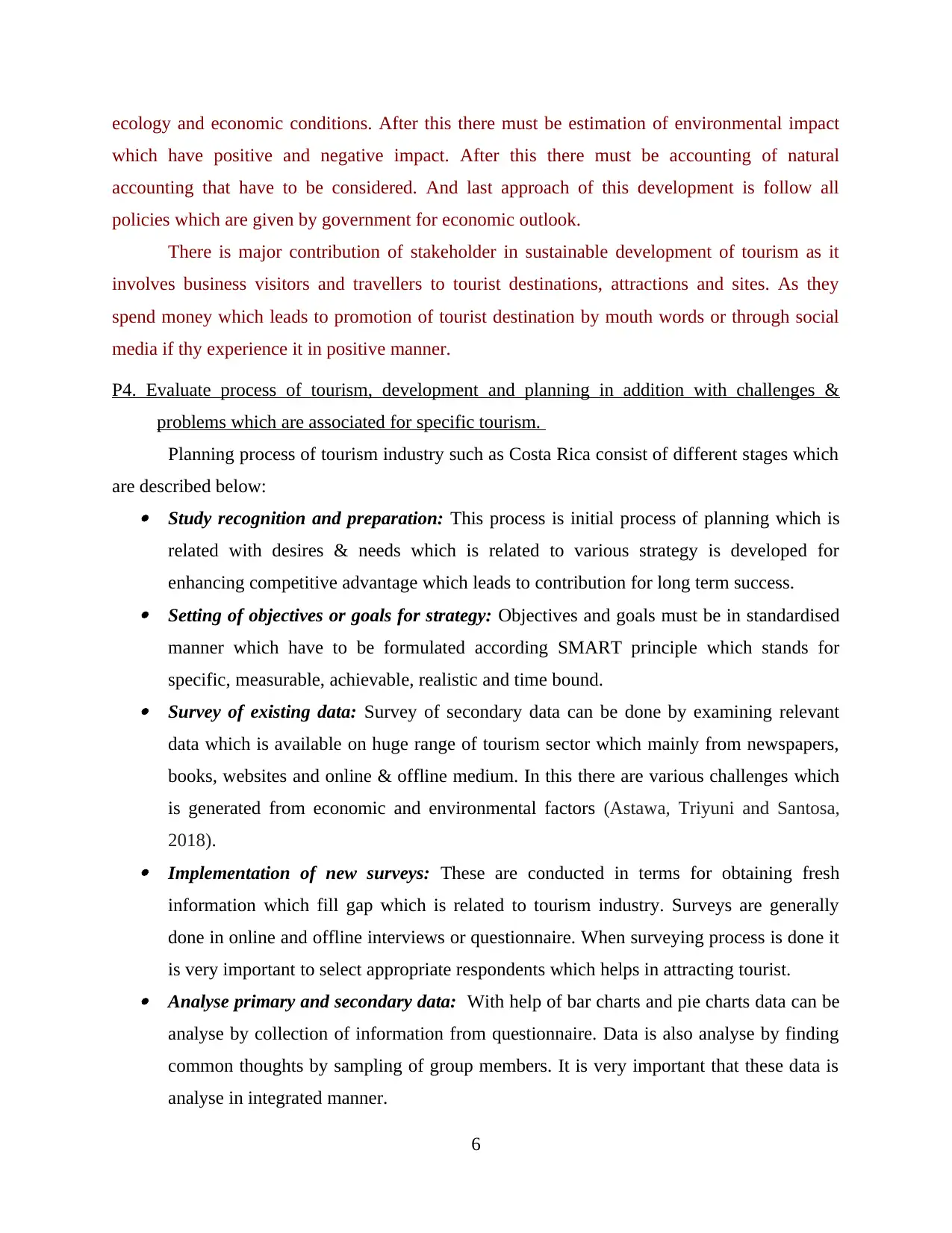
ecology and economic conditions. After this there must be estimation of environmental impact
which have positive and negative impact. After this there must be accounting of natural
accounting that have to be considered. And last approach of this development is follow all
policies which are given by government for economic outlook.
There is major contribution of stakeholder in sustainable development of tourism as it
involves business visitors and travellers to tourist destinations, attractions and sites. As they
spend money which leads to promotion of tourist destination by mouth words or through social
media if thy experience it in positive manner.
P4. Evaluate process of tourism, development and planning in addition with challenges &
problems which are associated for specific tourism.
Planning process of tourism industry such as Costa Rica consist of different stages which
are described below: Study recognition and preparation: This process is initial process of planning which is
related with desires & needs which is related to various strategy is developed for
enhancing competitive advantage which leads to contribution for long term success. Setting of objectives or goals for strategy: Objectives and goals must be in standardised
manner which have to be formulated according SMART principle which stands for
specific, measurable, achievable, realistic and time bound. Survey of existing data: Survey of secondary data can be done by examining relevant
data which is available on huge range of tourism sector which mainly from newspapers,
books, websites and online & offline medium. In this there are various challenges which
is generated from economic and environmental factors (Astawa, Triyuni and Santosa,
2018). Implementation of new surveys: These are conducted in terms for obtaining fresh
information which fill gap which is related to tourism industry. Surveys are generally
done in online and offline interviews or questionnaire. When surveying process is done it
is very important to select appropriate respondents which helps in attracting tourist. Analyse primary and secondary data: With help of bar charts and pie charts data can be
analyse by collection of information from questionnaire. Data is also analyse by finding
common thoughts by sampling of group members. It is very important that these data is
analyse in integrated manner.
6
which have positive and negative impact. After this there must be accounting of natural
accounting that have to be considered. And last approach of this development is follow all
policies which are given by government for economic outlook.
There is major contribution of stakeholder in sustainable development of tourism as it
involves business visitors and travellers to tourist destinations, attractions and sites. As they
spend money which leads to promotion of tourist destination by mouth words or through social
media if thy experience it in positive manner.
P4. Evaluate process of tourism, development and planning in addition with challenges &
problems which are associated for specific tourism.
Planning process of tourism industry such as Costa Rica consist of different stages which
are described below: Study recognition and preparation: This process is initial process of planning which is
related with desires & needs which is related to various strategy is developed for
enhancing competitive advantage which leads to contribution for long term success. Setting of objectives or goals for strategy: Objectives and goals must be in standardised
manner which have to be formulated according SMART principle which stands for
specific, measurable, achievable, realistic and time bound. Survey of existing data: Survey of secondary data can be done by examining relevant
data which is available on huge range of tourism sector which mainly from newspapers,
books, websites and online & offline medium. In this there are various challenges which
is generated from economic and environmental factors (Astawa, Triyuni and Santosa,
2018). Implementation of new surveys: These are conducted in terms for obtaining fresh
information which fill gap which is related to tourism industry. Surveys are generally
done in online and offline interviews or questionnaire. When surveying process is done it
is very important to select appropriate respondents which helps in attracting tourist. Analyse primary and secondary data: With help of bar charts and pie charts data can be
analyse by collection of information from questionnaire. Data is also analyse by finding
common thoughts by sampling of group members. It is very important that these data is
analyse in integrated manner.
6
⊘ This is a preview!⊘
Do you want full access?
Subscribe today to unlock all pages.

Trusted by 1+ million students worldwide
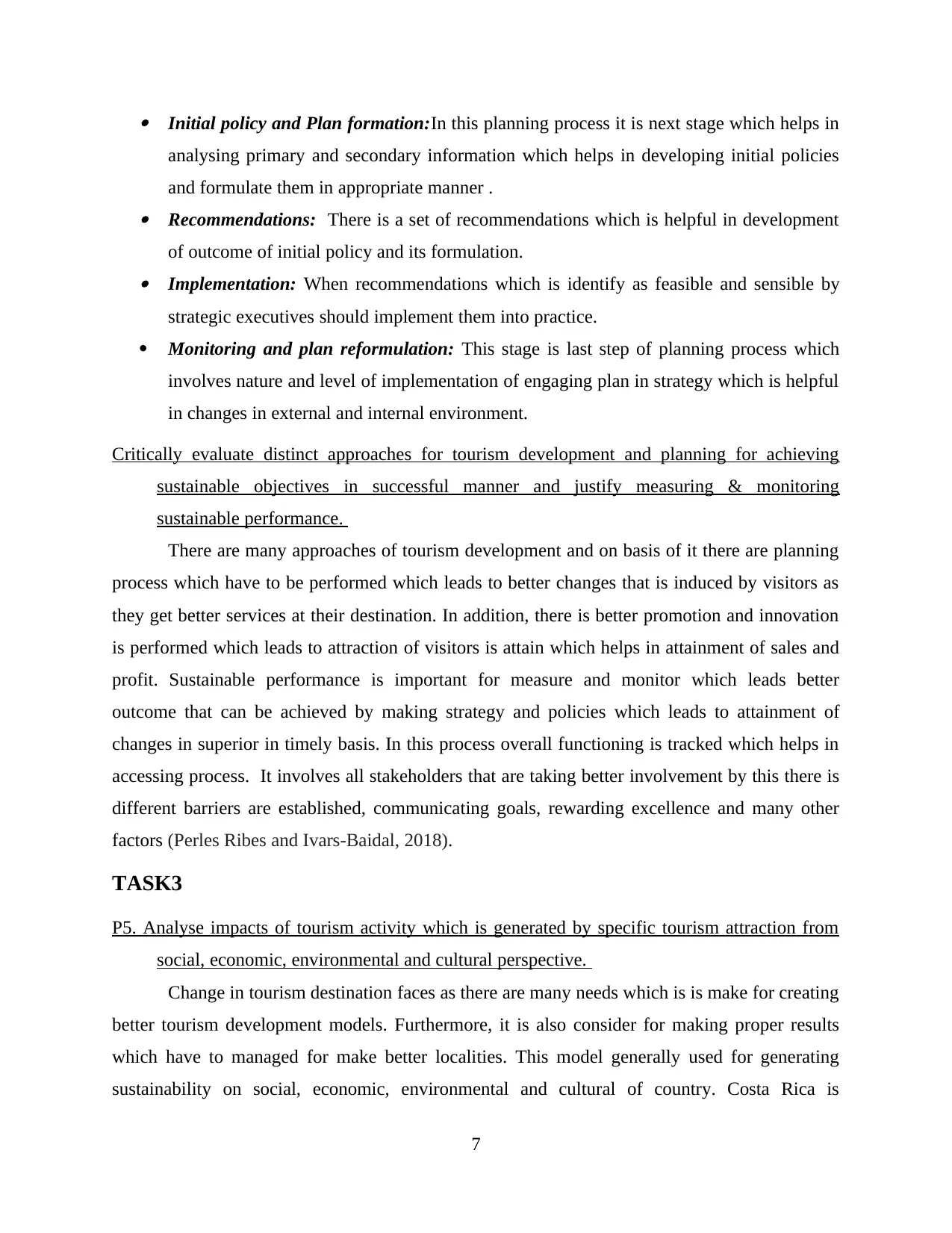
Initial policy and Plan formation:In this planning process it is next stage which helps in
analysing primary and secondary information which helps in developing initial policies
and formulate them in appropriate manner . Recommendations: There is a set of recommendations which is helpful in development
of outcome of initial policy and its formulation. Implementation: When recommendations which is identify as feasible and sensible by
strategic executives should implement them into practice.
Monitoring and plan reformulation: This stage is last step of planning process which
involves nature and level of implementation of engaging plan in strategy which is helpful
in changes in external and internal environment.
Critically evaluate distinct approaches for tourism development and planning for achieving
sustainable objectives in successful manner and justify measuring & monitoring
sustainable performance.
There are many approaches of tourism development and on basis of it there are planning
process which have to be performed which leads to better changes that is induced by visitors as
they get better services at their destination. In addition, there is better promotion and innovation
is performed which leads to attraction of visitors is attain which helps in attainment of sales and
profit. Sustainable performance is important for measure and monitor which leads better
outcome that can be achieved by making strategy and policies which leads to attainment of
changes in superior in timely basis. In this process overall functioning is tracked which helps in
accessing process. It involves all stakeholders that are taking better involvement by this there is
different barriers are established, communicating goals, rewarding excellence and many other
factors (Perles Ribes and Ivars-Baidal, 2018).
TASK3
P5. Analyse impacts of tourism activity which is generated by specific tourism attraction from
social, economic, environmental and cultural perspective.
Change in tourism destination faces as there are many needs which is is make for creating
better tourism development models. Furthermore, it is also consider for making proper results
which have to managed for make better localities. This model generally used for generating
sustainability on social, economic, environmental and cultural of country. Costa Rica is
7
analysing primary and secondary information which helps in developing initial policies
and formulate them in appropriate manner . Recommendations: There is a set of recommendations which is helpful in development
of outcome of initial policy and its formulation. Implementation: When recommendations which is identify as feasible and sensible by
strategic executives should implement them into practice.
Monitoring and plan reformulation: This stage is last step of planning process which
involves nature and level of implementation of engaging plan in strategy which is helpful
in changes in external and internal environment.
Critically evaluate distinct approaches for tourism development and planning for achieving
sustainable objectives in successful manner and justify measuring & monitoring
sustainable performance.
There are many approaches of tourism development and on basis of it there are planning
process which have to be performed which leads to better changes that is induced by visitors as
they get better services at their destination. In addition, there is better promotion and innovation
is performed which leads to attraction of visitors is attain which helps in attainment of sales and
profit. Sustainable performance is important for measure and monitor which leads better
outcome that can be achieved by making strategy and policies which leads to attainment of
changes in superior in timely basis. In this process overall functioning is tracked which helps in
accessing process. It involves all stakeholders that are taking better involvement by this there is
different barriers are established, communicating goals, rewarding excellence and many other
factors (Perles Ribes and Ivars-Baidal, 2018).
TASK3
P5. Analyse impacts of tourism activity which is generated by specific tourism attraction from
social, economic, environmental and cultural perspective.
Change in tourism destination faces as there are many needs which is is make for creating
better tourism development models. Furthermore, it is also consider for making proper results
which have to managed for make better localities. This model generally used for generating
sustainability on social, economic, environmental and cultural of country. Costa Rica is
7
Paraphrase This Document
Need a fresh take? Get an instant paraphrase of this document with our AI Paraphraser
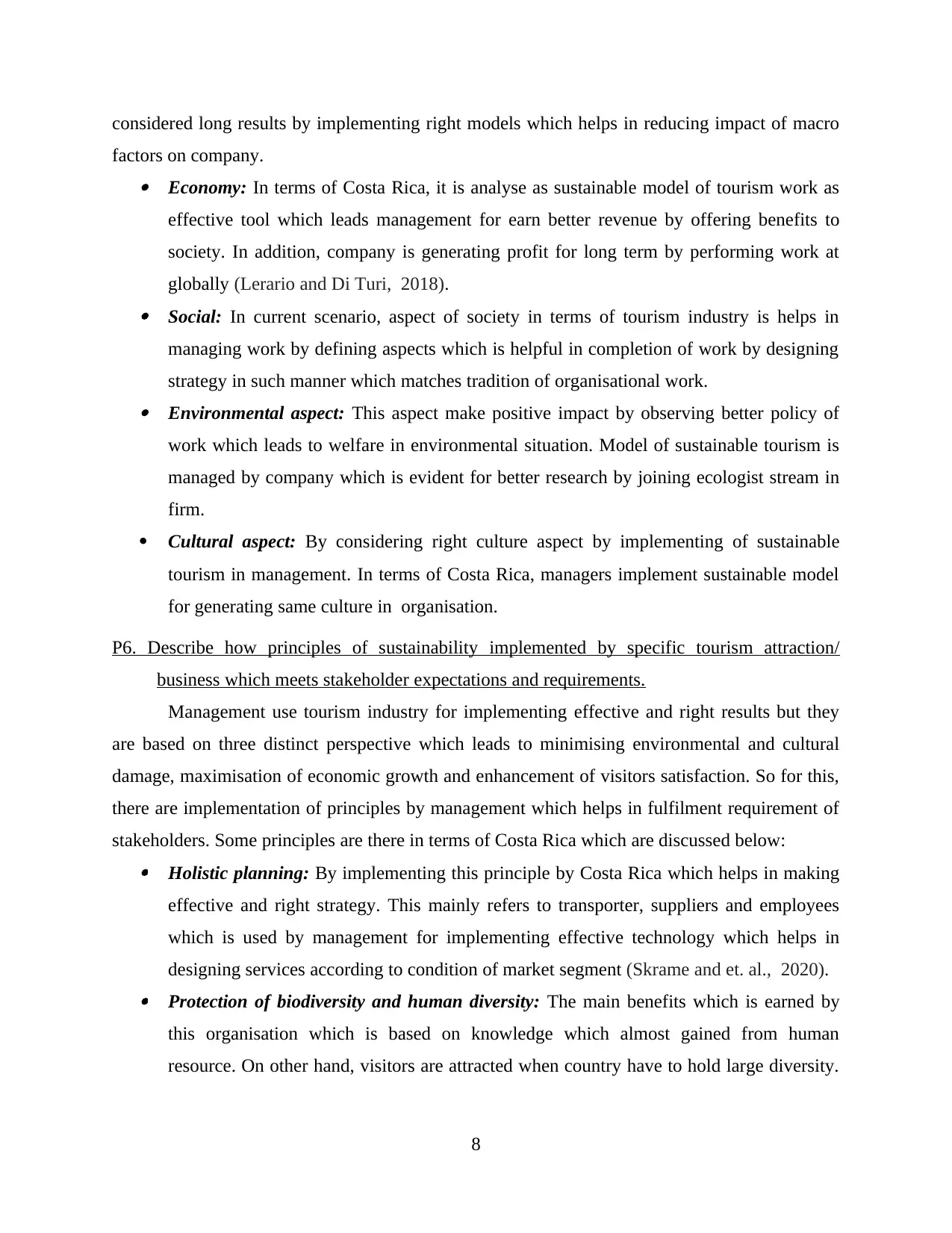
considered long results by implementing right models which helps in reducing impact of macro
factors on company. Economy: In terms of Costa Rica, it is analyse as sustainable model of tourism work as
effective tool which leads management for earn better revenue by offering benefits to
society. In addition, company is generating profit for long term by performing work at
globally (Lerario and Di Turi, 2018). Social: In current scenario, aspect of society in terms of tourism industry is helps in
managing work by defining aspects which is helpful in completion of work by designing
strategy in such manner which matches tradition of organisational work. Environmental aspect: This aspect make positive impact by observing better policy of
work which leads to welfare in environmental situation. Model of sustainable tourism is
managed by company which is evident for better research by joining ecologist stream in
firm.
Cultural aspect: By considering right culture aspect by implementing of sustainable
tourism in management. In terms of Costa Rica, managers implement sustainable model
for generating same culture in organisation.
P6. Describe how principles of sustainability implemented by specific tourism attraction/
business which meets stakeholder expectations and requirements.
Management use tourism industry for implementing effective and right results but they
are based on three distinct perspective which leads to minimising environmental and cultural
damage, maximisation of economic growth and enhancement of visitors satisfaction. So for this,
there are implementation of principles by management which helps in fulfilment requirement of
stakeholders. Some principles are there in terms of Costa Rica which are discussed below: Holistic planning: By implementing this principle by Costa Rica which helps in making
effective and right strategy. This mainly refers to transporter, suppliers and employees
which is used by management for implementing effective technology which helps in
designing services according to condition of market segment (Skrame and et. al., 2020). Protection of biodiversity and human diversity: The main benefits which is earned by
this organisation which is based on knowledge which almost gained from human
resource. On other hand, visitors are attracted when country have to hold large diversity.
8
factors on company. Economy: In terms of Costa Rica, it is analyse as sustainable model of tourism work as
effective tool which leads management for earn better revenue by offering benefits to
society. In addition, company is generating profit for long term by performing work at
globally (Lerario and Di Turi, 2018). Social: In current scenario, aspect of society in terms of tourism industry is helps in
managing work by defining aspects which is helpful in completion of work by designing
strategy in such manner which matches tradition of organisational work. Environmental aspect: This aspect make positive impact by observing better policy of
work which leads to welfare in environmental situation. Model of sustainable tourism is
managed by company which is evident for better research by joining ecologist stream in
firm.
Cultural aspect: By considering right culture aspect by implementing of sustainable
tourism in management. In terms of Costa Rica, managers implement sustainable model
for generating same culture in organisation.
P6. Describe how principles of sustainability implemented by specific tourism attraction/
business which meets stakeholder expectations and requirements.
Management use tourism industry for implementing effective and right results but they
are based on three distinct perspective which leads to minimising environmental and cultural
damage, maximisation of economic growth and enhancement of visitors satisfaction. So for this,
there are implementation of principles by management which helps in fulfilment requirement of
stakeholders. Some principles are there in terms of Costa Rica which are discussed below: Holistic planning: By implementing this principle by Costa Rica which helps in making
effective and right strategy. This mainly refers to transporter, suppliers and employees
which is used by management for implementing effective technology which helps in
designing services according to condition of market segment (Skrame and et. al., 2020). Protection of biodiversity and human diversity: The main benefits which is earned by
this organisation which is based on knowledge which almost gained from human
resource. On other hand, visitors are attracted when country have to hold large diversity.
8
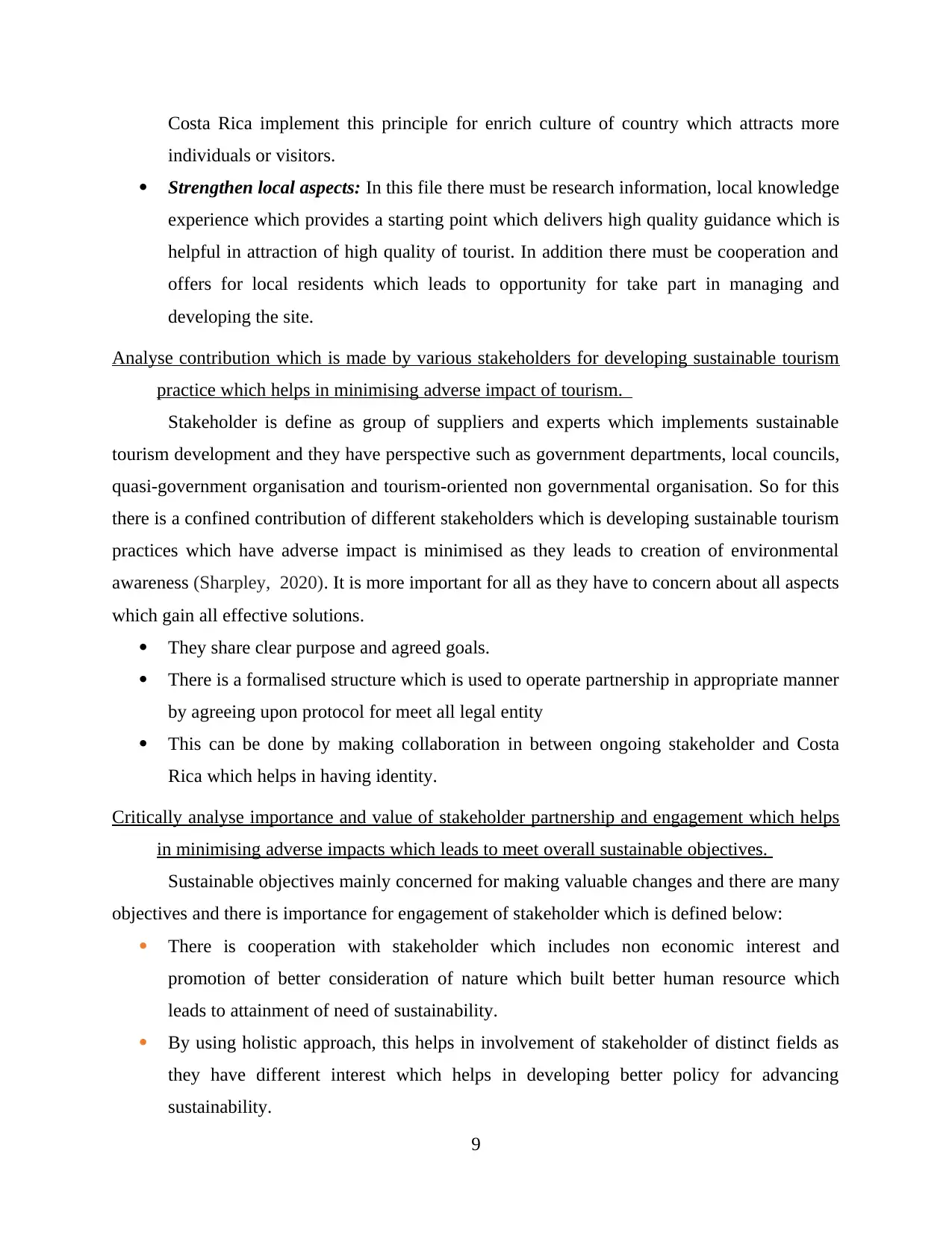
Costa Rica implement this principle for enrich culture of country which attracts more
individuals or visitors.
Strengthen local aspects: In this file there must be research information, local knowledge
experience which provides a starting point which delivers high quality guidance which is
helpful in attraction of high quality of tourist. In addition there must be cooperation and
offers for local residents which leads to opportunity for take part in managing and
developing the site.
Analyse contribution which is made by various stakeholders for developing sustainable tourism
practice which helps in minimising adverse impact of tourism.
Stakeholder is define as group of suppliers and experts which implements sustainable
tourism development and they have perspective such as government departments, local councils,
quasi-government organisation and tourism-oriented non governmental organisation. So for this
there is a confined contribution of different stakeholders which is developing sustainable tourism
practices which have adverse impact is minimised as they leads to creation of environmental
awareness (Sharpley, 2020). It is more important for all as they have to concern about all aspects
which gain all effective solutions.
They share clear purpose and agreed goals.
There is a formalised structure which is used to operate partnership in appropriate manner
by agreeing upon protocol for meet all legal entity
This can be done by making collaboration in between ongoing stakeholder and Costa
Rica which helps in having identity.
Critically analyse importance and value of stakeholder partnership and engagement which helps
in minimising adverse impacts which leads to meet overall sustainable objectives.
Sustainable objectives mainly concerned for making valuable changes and there are many
objectives and there is importance for engagement of stakeholder which is defined below:
There is cooperation with stakeholder which includes non economic interest and
promotion of better consideration of nature which built better human resource which
leads to attainment of need of sustainability.
By using holistic approach, this helps in involvement of stakeholder of distinct fields as
they have different interest which helps in developing better policy for advancing
sustainability.
9
individuals or visitors.
Strengthen local aspects: In this file there must be research information, local knowledge
experience which provides a starting point which delivers high quality guidance which is
helpful in attraction of high quality of tourist. In addition there must be cooperation and
offers for local residents which leads to opportunity for take part in managing and
developing the site.
Analyse contribution which is made by various stakeholders for developing sustainable tourism
practice which helps in minimising adverse impact of tourism.
Stakeholder is define as group of suppliers and experts which implements sustainable
tourism development and they have perspective such as government departments, local councils,
quasi-government organisation and tourism-oriented non governmental organisation. So for this
there is a confined contribution of different stakeholders which is developing sustainable tourism
practices which have adverse impact is minimised as they leads to creation of environmental
awareness (Sharpley, 2020). It is more important for all as they have to concern about all aspects
which gain all effective solutions.
They share clear purpose and agreed goals.
There is a formalised structure which is used to operate partnership in appropriate manner
by agreeing upon protocol for meet all legal entity
This can be done by making collaboration in between ongoing stakeholder and Costa
Rica which helps in having identity.
Critically analyse importance and value of stakeholder partnership and engagement which helps
in minimising adverse impacts which leads to meet overall sustainable objectives.
Sustainable objectives mainly concerned for making valuable changes and there are many
objectives and there is importance for engagement of stakeholder which is defined below:
There is cooperation with stakeholder which includes non economic interest and
promotion of better consideration of nature which built better human resource which
leads to attainment of need of sustainability.
By using holistic approach, this helps in involvement of stakeholder of distinct fields as
they have different interest which helps in developing better policy for advancing
sustainability.
9
⊘ This is a preview!⊘
Do you want full access?
Subscribe today to unlock all pages.

Trusted by 1+ million students worldwide
1 out of 16
Related Documents
Your All-in-One AI-Powered Toolkit for Academic Success.
+13062052269
info@desklib.com
Available 24*7 on WhatsApp / Email
![[object Object]](/_next/static/media/star-bottom.7253800d.svg)
Unlock your academic potential
Copyright © 2020–2026 A2Z Services. All Rights Reserved. Developed and managed by ZUCOL.





